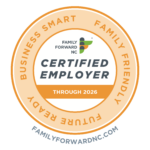The conference was held Saturday, March 7, 2020, with 49 early education professionals in attendance. Thanks all the presenters and attendees for a great day!
Love’s Creek Baptist Church, Siler City
Theme: Meeting the Needs of ALL Children
Learn how to have an inclusive classroom where all children are supported regardless of their culture, race, special needs, or background.
Keynote by: Dr. Rhonda Taylor-Bullock, native of Goldston, NC, and co-founder and director of we are (Working to Extend Anti-Racist Education)
Earn 5.0 hours of DCDEE credit by attending the keynote address and choosing two 2-hour workshops.
Grant Materials
Every child care professional participating will receive early childhood classroom materials funded by Smart Start to be used in an early childhood classroom.
[maxbutton id=”17″ url=”https://www.eventbrite.com/e/chatham-county-child-care-professional-conference-2020-registration-88496167419″ ]
Workshops
Session 1
What does Trauma-Informed Child Care Look and Feel Like?- Ennis Baker and Amanda Hazen, NC Infant Toddler Program
Early educators have children in their care that have been through or are currently going through trauma. This workshop will give you a framework of care that involves understanding, recognizing, and responding to different types of trauma. Participants will learn about the essential ingredients of trauma-informed child care including: promoting self-care, self-awareness, self-regulation, equity and inclusion, workday wellness, and reducing stress for adults and children. A specialist from the North Carolina Infant/Toddler project will guide interactive activities designed to promote resilience and help participants move from surviving to thriving.
Tiny Steps or Leaps and Bounds- Janet Groce-Fields, CDSA
This workshop will focus on teaching participants how to identify critical developmental milestones in early childhood (birth to five years). When early educators are familiar with typical developmental milestones, they can identify the red flags that alert us to children who may be developmentally delayed. Participants will gain an understanding of common risk factors that may lead to developmental delays and will deepen their understanding of the role early childhood professionals play in monitoring young children’s development. At the end of the training, participants will receive community resources and will know how to help parents through the process of referring their children for developmental screening.
Read With Me, To Me, and About Me- Imani Sie-Duke, Chatham County Partnership for Children
Reading is not only a proven way to build language, vocabulary, and
comprehension but also a way to give children experiences and knowledge about themselves and the world around them. This session will explore: 1) reading strategies to help read with children rather than to them 2) inclusion reading strategies for all children 3) culturally and linguistically responsive literacy activities 4) how to choose books to reflect the demographic of your classroom and 5) how to enhance your understanding of the classroom demographic.
Mindfulness in the Classroom- Allie Grimes, growga
Mindfulness practices in the daily classroom routine help children develop tools to cope with life’s stress and relieve anxiety. The benefit for teachers is a calmer classroom as children improve their focus, attention, and emotional control. This workshop will provide you with hands on, applicable techniques to use in your classroom.
Reframing the Way We View and Respond to Challenging Behaviors: The difference between difficult and mistaken behaviors- Kristan Leonard, KidSCope
Children often engage in challenging behaviors that adults find difficult to manage. While difficult behaviors may be an expression of typical child development some behaviors are communicating a greater need that adult caregivers may overlook. Punishing difficult or mistaken behaviors may stop the behavior in the moment but it will not change the behavior over time. By helping to clarify the difference between difficult behaviors and ones that communicate a deeper need, as well as establishing the difference between punishment and discipline, we can explore new disciplinary practices that encourage connections and change behavior through teaching and guidance rather than power and control.
Session 2
Behavioral Intervention Strategies: You want me to try what?- Betsy Sanville, Chatham County Partnership for Children
Teachers who care for children with behavioral difficulties often find themselves reacting in ways that reinforce the behavior and make it worse. Behavioral intervention strategies are planned responses to behaviors that help teachers prepare for situations in which past responses have not been successful. This session focuses on helping participants develop new responses to challenging behaviors using six key intervention strategies.
Exploring Social Emotional Development within the Context of Relationships (for Infant and Toddler Teachers)- Kris Lee, Chatham County Partnership for Children
Through supportive relationships, infants and toddlers develop a sense of trust, learn how to interact with others and eventually learn how to express empathy. Strong, nurturing relationships are the key to healthy development for infants and toddlers. This workshop will explore social emotional development within the context of relationships. Participants will learn how providing responsive care through the process of getting in tune will help infants and toddlers form secure relational attachments and develop a strong foundation from which they can explore their environment.
How to be an Asthma Friendly Child Care Program- Dorothy Rawleigh, Chatham County Health Department
Asthma is a common condition in childhood. In the United States, 10% to 15% of children in grade school have or have had asthma. During this training, participants will gain knowledge and confidence in how to include and care for children who have asthma in the child care setting. Topics covered include: what is asthma, steps to control it in the child care setting, asthma triggers in the child care environment and how to create and implement a plan to reduce these triggers.
Kindergarten Readiness: It’s not Just About Academics- Pam Anderson, Chatham County Partnership for Children
Executive functions enable us to control our thoughts, emotions and behaviors and are an excellent predictor of later life outcomes. By the time a child enters kindergarten individual differences in executive functioning can predict not just academic achievement, but also adult social and relationship skills, health, income, and a person’s chance of engaging in criminal activity. Learn how to use your teaching powers to intentionally support children in this crucial area of development and get them on the road to a successful life.
Supporting Dual Language Learners- Adriana Martinez, Spanish For Fun
Description coming soon.












